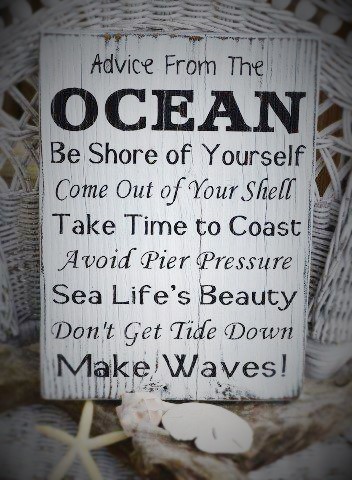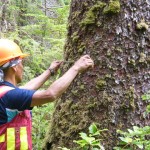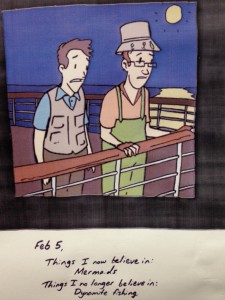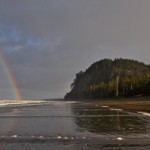- Blog Categories
- Guided Reading Index Post
- Quick Reading
- It Just Works!
- Bring Back The Fish
- Good News For The Planet
- Parables For And From The Heart
- Bad News For The Planet
- Get Your Ocean Geek On
- School of Ocean Pastures Ecoengineering
- Business News From The Blue Planet
- Legal Ocean Rutter
- In Support
- Geoengineering ?
- Cartoons
- Bizarre News For The Planet
- Other Pursuits
- Contact
- Links
- Antagonists
Living Outside The Box
 Ocean life taking charge!
Ocean life taking charge!
 If you know any good fish puns let minnow.
If you know any good fish puns let minnow. The best time to plant a tree is 40 years ago, the second best time is now.

One of our Old Massett forestry techs measuring a Sitka Spruce a few years back. This tree is now spared, along with a hundred thousand friends, from the saw forever! It only took ten years of effort .

Imagine having to cross the river here to get to work on another forest restoration and preservation project.
Search this site
Recent Posts
- Russian Volcano Bezymianny Brings Back The Fish
- Ocean Pasture Restoration Will Immediately Resolve Methane Crisis
- Who Speaks For The Salt Water ‘People’
- Open Letter To Academia And President Biden
- In Your Best Marlon Brando, Col Kurtz, voice -The Horror
- COP26 Glasgow Ocean Pasture Restoration To The Rescue
- Ocean Pasture Collapse Causing Global Dimming Driver Of Climate Change
- Shipping Industry Wants To Help Save Their Blue Planet
- Ocean Pasture Restoration 2002 with BBC
- Atmospheric Methane Rise From Isoprene Demise Correlated With Collapse Of Ocean Pastures
- Genomics Shows Starving Cod Shrink In Size And Numbers On Dying Ocean Pastures
- I Am Salmon Film
- King Salmon Study Proves Their Demise Is Due To Starving At Sea
- A Picture Tells A Thousand Words, Bring Back The Fish
- Kasatochi – A Volcano Miracle For The Ocean
- North Pacific Chum Salmon Returns Absolutely Dismal
- Stop The Fires By Restoring The West’s Rain Making Ocean Pastures
- Arctic Ocean Pastures Are Flourishing In Wondrous Bloomsday Not Doomsday
- More Confirmation That Ocean Plankton Make Our Planets Clouds
- Ocean Basification Is Natures Way Of Avoiding Ocean Acidification
- Starving, Shrinking, Sardines Of Europe Just 1/2 Size Of 12 Years Ago
- Old And Newly Collected Plankton Reveals An Ocean Catastrophe
- Ancient Paleozoic Oceans Recieved More Iron Rich Dust Than Todays Dust Starved Oceans
- Mother Nature Likes To Rock
Interesting Snippets
Often one cannot catch the unknown in a net of the known. - anon
"There is something fascinating about science. One gets such wholesale returns of conjecture out of such trifling investment of fact." Mark Twain, Life on the Mississippi
"It's like religion. Heresy in science is thought of as a bad thing, whereas it should be just the opposite." - Thomas Gold
Unnamed Law: If it happens, it must be possible.
" If you steal from one person, well they call that plagarism. I steal from everyone, they call that research. - Woody Guthrie
“If they can get you asking the wrong questions, they don't have to worry about answers.”
When a distinguished but elderly scientist states that something is possible, he is almost certainly right. When he states that something is impossible, he is very probably wrong. - Arthur C. Clarke's First Law
It is through science that we prove, but through intuition that we discover. - H. Poincare
"Nothing is too wonderful to be true if it be consistent with the laws of nature." - Michael Faraday
A new scientific truth does not triumph by convincing its opponents and making them see the light, but rather because its opponents eventually die and a new generation grows up that is familiar with it. - Max Planck
Corollary: Science advances funeral by funeral.
A man with a new idea is a crank until he succeeds. - Mark Twain
Never attribute to conspiracy that which is adequately explained by stupidity. - R. George
Don't worry about people stealing your ideas. If your ideas are that good, you'll have to ram them down people's throats. - Howard Aiken
I am tired of all this sort of thing called science here ... We have spent millions in that sort of thing for the last few years, and it is time it should be stopped. - U.S. Senator Simon Cameron, on the Smithsonian Institute (1901)
The one who says it cannot be done should never interrupt the one who's doing it! The Roman Rule
"I never make predictions, especially about the future" - Casey Stengle





Top Envrionmental Law Schools Voice Support
“There’s a ruckus going on over an experiment in ocean fertilization conducted off the coast of British Columbia…”
October 18, 2012 by Ted Parson
There’s a ruckus going on over an experiment in ocean fertilization conducted off the coast of British Columbia in July and disclosed this week. The Haida Salmon Restoration Corporation, an enterprise of the Haida village of Old Massett, used a large fishing vessel to spread 100 tons of iron sulfate-rich dust on the ocean surface west of Haida Gwaii (or the Queen Charlotte Islands). The aim of the release was to increase plankton growth and thereby promote growth of fisheries and maybe also remove carbon from the atmosphere.
Such interventions exist in a near legal vacuum. Critics of the Old Massett Haida project are claiming it violates international law, but this is simply not true.
Mainly due to vigorous lobbying by a couple of small NGOs (the same ones now outraged at the Haida project), parties to the CBD have adopted two decisions discouraging ocean fertilization, and geoengineering generally. But these are purely advisory – and are moreover so clumsily drafted that even if they were legally binding (which they are not), their operational meaning would be utterly opaque. To check for yourself, you can read the most relevant decision here.
Oddly, the more interesting question about this particular experiment is whether it violated any applicable Canadian law. On this, everyone is busily in damage-control mode: the project operator says they kept all relevant officials informed throughout development of the project; their opponents are saying they clearly broke multiple laws; and Environment Canada is saying the matter is under investigation. I’d like to be a fly on that wall.
The second nasty challenge about potential legal/political control over geoengineering that this project raises concerns the fuzziness of scale boundaries. This little dump – and yes, it is little – elicited howls of outrage out of proportion to its actual impact, and to the non-reaction to many other commonplace activities with impacts as big or bigger. This is because, by calling this “geoengineering”, it attains a status of precedent, symbol – the thin end of the wedge. Opponents of ever doing geoengineering on a large scale think it’s important to stop even small things that look like geoengineering.
Read more on the Legal Planet blog….